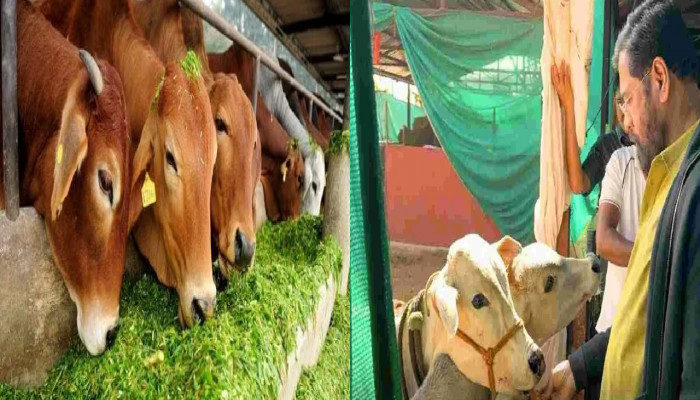Maharashtra Declares Indigenous Cows as ‘Rajyamata Gomata’: A Step Towards Preserving Native Breeds
In a landmark decision aimed at promoting the welfare of indigenous cattle breeds, the Maharashtra government has declared native cows as ‘Rajyamata Gomata’ (Mother of the State). This declaration is part of a larger effort by the state to honor and protect indigenous breeds, which are integral to the rural economy, traditional agriculture, and cultural heritage of India.
This move is expected to have a significant impact on cattle farming, dairy production, and rural livelihoods in Maharashtra, as well as promote awareness about the importance of conserving local breeds that are naturally adapted to India’s climate and conditions.
The term ‘Rajyamata Gomata’ reflects the reverence for cows in Indian culture, where they are traditionally seen as symbols of fertility, prosperity, and nurturing. By conferring this title on indigenous cows, the Maharashtra government emphasizes their crucial role in the agrarian economy. Native breeds are known for their resilience, resistance to diseases, and ability to thrive in the country’s varied climatic conditions. They contribute significantly to organic farming practices and are valued for their A2 milk, which is considered healthier than the milk from crossbred or exotic varieties.

This initiative also aims to bring attention to the challenges facing indigenous cattle, which have been overshadowed by high-yield foreign breeds that are often preferred for their greater milk production. By giving these cows the status of ‘Rajyamata Gomata’, Maharashtra seeks to protect and revive these native breeds, ensuring they receive the recognition and care they deserve.
Indigenous cows such as the Gir, Red Sindhi, and Sahiwal are known for their exceptional adaptation to India’s environment. They are better suited to the country’s tropical climate and require less water and feed compared to foreign breeds. Additionally, they are more resistant to common diseases, reducing the need for expensive veterinary care and medicines.
These cows produce A2 milk, which is considered to be easier to digest and richer in nutrients compared to A1 milk, commonly found in the milk of foreign breeds. A2 milk is believed to be more suitable for those with lactose intolerance and has gained popularity due to its health benefits, making indigenous cows an important asset for the dairy industry.
Indigenous cows are also central to organic farming, providing high-quality manure that is used to enrich soil fertility and reduce the dependence on chemical fertilizers. Their urine is used in traditional medicine and organic pest control practices, further underlining their ecological importance.
Despite of their advantages, indigenous cow breeds face several challenges. Over the past few decades, crossbreeding programs have led to a decline in the population of native cattle, as farmers increasingly turn to foreign breeds for higher milk yields. This has put indigenous breeds at risk of becoming endangered.
Additionally, the commercialization of the dairy industry has led to a preference for high-production cows, sidelining the economic and environmental benefits offered by indigenous breeds. The ‘Rajyamata Gomata’ declaration aims to reverse this trend by raising awareness and promoting the benefits of preserving native cows.
Following the declaration of ‘Rajyamata Gomata’, the Maharashtra government has laid out a series of initiatives to protect and promote indigenous cattle. These include financial incentives for farmers who rear native cows, subsidies for setting up cattle shelters, and the establishment of breeding centers to ensure the survival of these breeds.
The government also plans to conduct awareness campaigns to educate farmers on the long-term benefits of indigenous cows, not only for milk production but also for organic farming and sustainable agricultural practices. By promoting A2 milk and encouraging organic dairy farming, the government hopes to create a more profitable and environmentally friendly market for indigenous cow products.
Source: https://www.thehawk.in/news/states-and-uts/maharashtra/maharashtra-govt-declares-indigenous-cow-as-rajya-mata-launches-subsidy-scheme#google_vignette
https://www.indiatoday.in/india/story/maharashtra-bjp-nda-indigenous-cow-rajyamata-gomata-assembly-election-2608721-2024-09-30
https://economictimes.indiatimes.com/news/india/maharashtra-declares-indigenous-cows-rajyamata-gomata-ahead-of-assembly-elections/videoshow/113824550.cms?from=mdr





